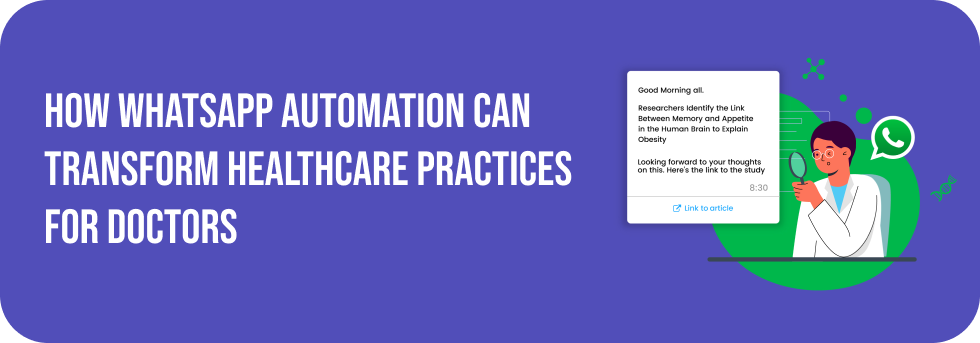With digital communication channels becoming more integrated into everyday life, healthcare providers are increasingly exploring innovative ways to streamline patient interactions. WhatsApp, a leading messaging platform with over 2 billion users worldwide, has emerged as an effective tool for doctors to manage patient communications efficiently. Automating patient interactions on WhatsApp can empower doctors to save time, enhance the patient experience, and focus more on providing quality care.
1. Streamlined Appointment Booking
One of the primary challenges in a healthcare practice is managing appointments effectively. By using WhatsApp automation, doctors can allow patients to book, reschedule, or cancel appointments seamlessly. Instead of calling a receptionist or visiting the clinic, patients can interact with an automated WhatsApp chatbot that provides:
- Available time slots based on the doctor’s schedule.
- Instant confirmation of appointments.
- Reminders for upcoming appointments, reducing no-shows.
This automation not only saves time for the administrative team but also offers a smooth and user-friendly experience for patients.
2. Efficient Patient Queries and FAQs
Doctors often receive a high volume of repetitive inquiries from patients, including questions about clinic hours, location, or general health tips. WhatsApp automation enables the clinic to answer these frequently asked questions instantly. A WhatsApp chatbot can be programmed to:
- Provide clinic location with maps.
- Share business hours and contact details.
- Answer common health-related FAQs or post-treatment care instructions.
This reduces the load on clinic staff, freeing them up for more critical tasks, and ensures patients get the information they need quickly.
3. Sending Prescriptions and Lab Reports Securely
With WhatsApp’s end-to-end encryption, sensitive documents like prescriptions, lab reports, and follow-up instructions can be securely shared directly with patients. Automated workflows can be set up to:
- Send prescriptions directly after a consultation.
- Share lab results as soon as they’re available.
- Deliver customized follow-up instructions based on patient needs.
This convenience reduces paperwork and eliminates the need for patients to revisit the clinic for documents, improving patient satisfaction and compliance with follow-up care.
4. Patient Follow-ups and Reminders
Regular follow-ups are essential, especially for patients with chronic conditions. WhatsApp automation can manage these follow-ups by sending personalized reminders for:
- Medication schedules and refills.
- Follow-up appointments post-surgery or treatment.
- Regular health check-ups for chronic conditions like diabetes or hypertension.
These timely reminders help patients stay on track with their treatments and improve outcomes, while also helping doctors ensure that their patients are complying with medical advice.
5. Remote Healthcare Support for Remote Consultations
For doctors offering Remote Healthcare, WhatsApp can be a powerful platform to manage remote consultations, especially with automation that:
- Send a link to join a telemedicine call.
- Collects pre-consultation information such as symptoms and medical history.
- Provides post-consultation follow-up with recommendations or prescriptions.
This automation ensures that remote consultations are as efficient as in-person visits, expanding access to healthcare, especially for patients in chronic disease like Corona.
6. Patient Feedback Collection and Satisfaction Surveys
Understanding patient satisfaction is vital for improving healthcare services. WhatsApp automation enables doctors to send post-consultation surveys and feedback forms directly to patients. This automation can be set up to:
- Request ratings and comments on the consultation.
- Send thank-you notes to enhance patient relationships.
- Use feedback data to improve the overall patient experience.
By gathering real-time feedback, doctors can make informed decisions on how to enhance patient care, potentially resulting in better retention and word-of-mouth referrals.
7. Health Education and Personalized Tips
Healthcare providers can use WhatsApp automation to regularly send health-related tips, reminders, or lifestyle advice. This can be particularly useful for doctors in specialty areas, such as pediatricians or cardiologists, who might want to provide ongoing education to their patients. Examples of automated messages include:
- Tips for managing specific health conditions, like diabetes.
- Seasonal health reminders, such as flu shots in winter.
- Wellness tips for nutrition, exercise, or mental health.
These messages keep patients engaged with the practice and add value by providing essential health insights outside the clinic.
Conclusion
Incorporating WhatsApp automation into a medical practice allows doctors to stay connected with their patients more efficiently while reducing administrative burdens. From booking appointments to sending health tips, WhatsApp automation enhances the patient experience, reduces no-shows, and ensures a more organized workflow for the healthcare team.
Ultimately, adopting WhatsApp automation in healthcare isn’t just about convenience—it’s about creating a patient-centered experience that is timely and accessible, leading to better patient outcomes and a stronger practice.

